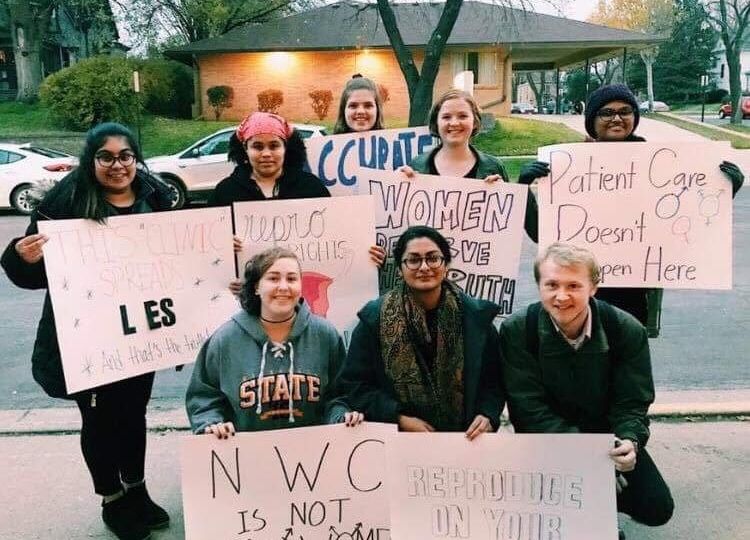
Members of Students for Reproductive Rights (SRR) gathered in downtown Northfield on Oct. 25 to protest the Northfield Women’s Center, an institution that aims to offer alternatives to abortion and support women and families.
“We did the protest to bring awareness to community members,” SRR Co-Chair Alisha Chaudhry ’19 said. “They should be informed about the center’s practices and misinformation.”
SRR placed a poster in the hallway leading to Boe Chapel prior to the protest that read: “NORTHFIELD WOMEN’S CENTER DOES NOT OFFER: Birth Control or Plan B, Medically accurate information about abortion, Unbiased and Pressure free counseling. No matter what you believe Women deserve the truth.”
Chaudhry said the Northfield Women’s Center places too much weight on the risks of having an abortion and not enough on the problems a potential parent might have after giving birth to a child they can’t support.
Another poster put up by SRR called the Northfield Women’s Center a “fake health clinic.” Executive Director of the Northfield Women’s Center Liz Blanchard took issue with this accusation.
Blanchard said this is a misconception many have about the Center. She said many people think their purpose is to give false information to women intending to get an abortion, and said this is not true.
“Women who have decided that they’re going to have an abortion rarely even call the center, they call the abortion clinic and they go have an abortion,” Blanchard said.
Co-Chair of SRR Guadalupe Romero ’20 said that the Northfield Women’s Center makes false medical claims in an effort to discourage abortion.
“I’ve heard that they use scare tactics and tell women abortion causes breast cancer, which is not true,” Romero said. “I think that’s very dangerous, especially with healthcare professionals, who we see as an authority.”
Blanchard said that the Northfield Women’s Center does not claim that abortion causes breast cancer, but rather that a protective change occurs in breast tissue if a pregnancy is carried to full term.
Blanchard said that SRR’s postings have negative consequences for women because they pressure them to have an abortion.
“What happens when they [SRR] put out false information about us as they’re doing, is that women who need help who are pregnant and are feeling pressured by their circumstances or another person, a parent, a boyfriend, husband, and now they’ve read false information about who we are, where are they going to go for help?” Blanchard said.
Chaudhry said that SRR does not pressure anyone to have an abortion.
“None of us [say], you have to have an abortion,” Chaudhry said. “But we want people to have access.”
“We did the protest to bring awareness to community members. They should be informed about the center’s practices and misinformation.” – Alisha Chaudhry ’19
Following SRR’s display, Students Advocating for Informed Decisions (SAID), the St. Olaf chapter of Students for Life of America, mounted their own display expressing their support for the Northfield Women’s Center.
SAID’s display highlighted a positive interaction with the Northfield Women’s Center experienced by a woman named Brittany, and it described the Northfield Women’s Center’s goals. It also described the services offered by the Center including pregnancy tests, STD tests and ultrasounds.
“Because they [Northfield Women’s Center] offer all these wonderful services for women who choose to continue on with their pregnancy, we want to support them so that women are empowered to be able to make that choice,” SAID Co-President Emily Albrecht ’21 said.
Although the Northfield Women’s Center offers a multitude of services, abortion isn’t one of them.
“We don’t provide abortions because our mission is to support the many women who are looking for alternatives to abortion and need help with this choice,” Blanchard wrote in an email. “We provide resources that empower women who choose to continue their pregnancy, to be good parents while continuing their education and pursuing their dreams.”
Chaudhry emphasized the importance of the availability of abortion at medical establishments.
“We want people to have access versus trying to invoke sanctity of life in one scenario, versus we care about the sanctity of life in all scenarios – especially once that life is in the world,” Chaudhry said.















